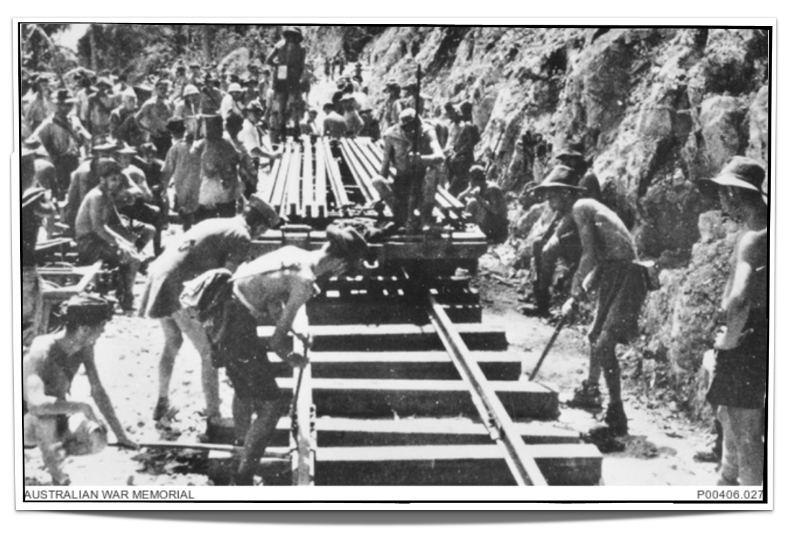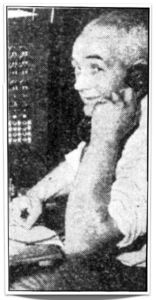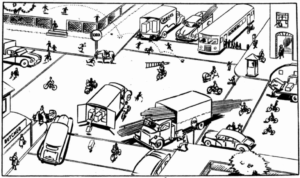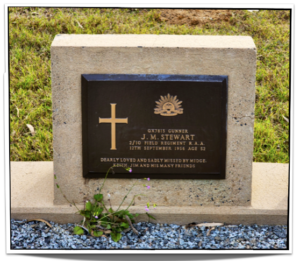
Prisoners of War working on the Burma Railway.
Grandchester History
Sergeant James Miller Stewart
At the end of World War 11, in October 1945, all Australians who were concentrated in Singapore, and the prisoners recovered from the Japanese, were returned to Australia.
Sergeant James Miller Stewart (QX7813), a gunner in the 2/10th Artillery Regiment, 8th Division, was amongst them. He was on the seriously ill list. James had been a prisoner in Camp No 9670 on Java and was recovered from the Japanese at Siam on 20th August 1945.
 Queensland Prisoners of War and duty personnel embarked at Singapore on the hospital ship Manunda on 24th October 1945 for Australia. James was transferred from the ship to the Concord Military Hospital in Sydney suffering from Amebiasis (a parasitic infection of the colon), Angina Pectoris (stable angina) and an old fracture of left angle. Along with other ex POWs and nursing sisters, he arrived in Brisbane on 30th October 1945. He was taken to the Military Hospital at Greenslopes for further treatment.
Queensland Prisoners of War and duty personnel embarked at Singapore on the hospital ship Manunda on 24th October 1945 for Australia. James was transferred from the ship to the Concord Military Hospital in Sydney suffering from Amebiasis (a parasitic infection of the colon), Angina Pectoris (stable angina) and an old fracture of left angle. Along with other ex POWs and nursing sisters, he arrived in Brisbane on 30th October 1945. He was taken to the Military Hospital at Greenslopes for further treatment.
James was born in Daviot, Aberdeen Scotland in 1904 and was the son of George Stewart and Annie Walker. He married his wife Yvonne Jean (nee Round) in Queensland in 1927. Before the war James worked as a cane cutter for the Kennys at Aloomba, North Queensland. He was a tractor driver when he enlisted at Cairns on in June 1940 aged 36 years.
James was taken prisoner by the Japanese on 15th February 1942 during the fall of Singapore. He was reported missing in April and it wasn’t until June 1943 that his wife was informed via a letter sent to her at Ayr, that he might be a prisoner. In August confirmation was sent to her via telegram. What an awful ordeal for all concerned!
As a P.O.W. for 3½ years James worked on the infamous Burma railway. The railway’s purpose was to supply Japanese forces in Burma, bypassing dangerous sea routes. One day during a 26-hour shift wielding an 8 lb. (3.62kg) hammer, he strained his heart.
Altogether, 2,815 Australians died working on the railway.
By April 1945 James and the other men had been POWs for 3 years. They had worked like slaves under the brutal Japanese regime on the Burma-Thai rail link. If you can mentally picture them, they had all endured starvation and tropical illnesses and were in terrible physical and emotional condition. They stood barefoot in pieces of rags, carrying very few personal items, having sold all they could for food and medicines.
Nonetheless, in a desperate bid by the Japanese, 1,000 of these Australian and British prisoners were rushed to build an escape road through virgin jungle across the Tenasserim Peninsula between Prachuab and Mergui in Thailand. This was the Mergui Escape Road. James was one of these men. This surely would have overwhelmed even the bravest of men. Only 450 men returned.
After the war James was appointed as the Postmaster at Grandchester.
A sub branch of th R.S.S.A.I.L.A. was formed at Grandchester in July 1948 and James was elected as Secretary.
On 4th June 1953 he was sworn in as a Justice of the Peace by Mr. J P. Donlevy, S.M..
In 1952 James entered a competition run by the Brisbane Telegraph and the Queensland Road Safety Council. All you had to do was send an original road safety slogan to the Telegraph at 93 Queen Street in order to win the chance of getting first prize of £50, second of £30 or third of £20. Entry was free. A diagram was published in the Telegraph.

On Thursday 6 November 1952, the following was printed on page 3 of the Brisbane Telegraph.
MAN WITH NO ROAD QUALMS WINS SLOGAN COMPETITION
A postmaster “living in a nice backwater where there is little need for road safety measures,” won the “Brisbane Telegraph” Road Safety Council slogan competition. He is former prisoner-of-war, Mr. James M. Stewart 48, of the small country settlement of Grandchester, 45 miles west of Brisbane on the main line to Toowoomba.
He won first prize of £50 with the slogan “Careless Acts Breed Tragic Facts.” This original slogan was chosen from thousands of entries submitted by readers in city and country centres throughout the State.
Unable to hold a driving licence because of a heart ailment, Mr Stewart exclaimed when told of his win: “Go to blazes! Did I? It isn’t possible!’
Grandchester is on a rough connecting road between Rosewood and Laidley and the road is seldom used. The only traffic which passes Mr. Stewart’s post office and residence are timber trucks and an occasional vehicle from nearby grazing properties.

James Miller Stewart died on 12th September 1956 and is buried in Grandchester Cemetery.
Lest We Forget.
© Jane Schy, 2024
